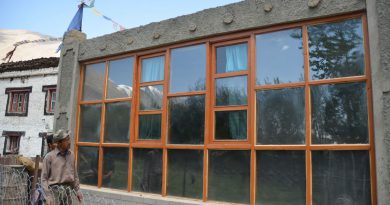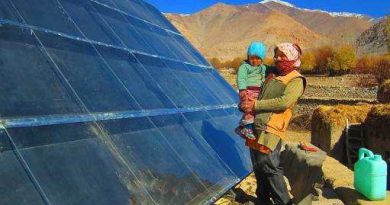DEVELOPMENTAL INTERVENTION IN ZANSKAR
Project period:
3 years (July 2013 to June 2016)
Project area:
Zanskar Sub Division, Kargil District
Donor:
The Dalai Lama Trust
Executive Summary / Content and goal of project:
In the back drop of HH the Dalai Lama’s wish to initiate a developmental cum social intervention in Zanskar sub division of Kargil district and after having entrusted the initiation of the venture to the Ladakh Ecological Development Group (LEDeG), Leh and consequent to the decisions of a meeting held on August, 10th, 2013 at Leh attended by Ven Ngari Rimpochhey,Ven Stanzin Takla, Secretary to the HH, Mr. Desang Tsering, Trustee, DLT and Mr. Jamphel Lhundup, Trustee, DLT, Sh Sonam Dawa, advisor, LEDeG, Mr. P. Namgail, President, LEDeG and Mr. Sonam Gyalson, Director LEDeG, an advisory committee was constituted comprising of eleven members from Zanskar including Ven Lama Chhosphel Zotpa, Geshe Lobsang Samten and Geshe Lobsang Yonten with Ven’ble Ngari Rimpochhey as the Petron/President and Sh Sonam Dawa as the vice president.
The LEDeG team after having consulted a range of public representatives and local authorities at Zanskar decided to take up interventions in the following areas of immediate public concerns that would lead to sustainable development of the area :
- Awareness programme / training (health, environment)
- Agriculture and forestry
- Animal Husbandry.
- Handicraft.
- Eco Tourism and Culture.
Specific interventions in the above mentions sectors would give an impetus to the present situation of agriculture, animal husbandry and the tourism trade as agriculture and animal husbandry have long been the mainstay of the majority of the communities with tourism offering tremendous scope for the present and the future.
There are 2267 households in the region with population of 13773, which cultivate 2369.45 hectares of land. Due to the low consumption of the chemical fertilizer this region is a boom for organic farming which can produces organic products with future potential for outside marketing.
There will be programme to train locals to improve on the methodologies and technologies for value addition of agriculture produce including new varieties of cereals, dairy products and handicraft beside general awareness programme on health, environment and tourism,.
Along with it women will be trained on the different ways to improve on the handicraft products for sale resulting in economic growth of the region.
Apart from this production and supply of vegetables seedling and plantation of willow and popular will be initiated. Women’s would be organized in to Self Help Groups (SHG) & marketing co-operative set up to provide avenue for marketing of the produce. Waste management and disposals program will be carried out in the major Gonpas leading to sustainable ecosystem.
Concept:
The extreme living conditions which exist in the remote Zanskar region of Kargil district of Ladakh are marked by difficult living conditions amidst secluded natural environs with scarce alternate livelihood options and poor soil productivity. Mono cropped agriculture employs about 95% 0f the inhabitants. Absence of vegetative covers and scanty natural resources and the resultant limitations in availability of biomass makes life harder in this arid alpine climate. Agriculture, animal husbandry and allied activities offer ample scope for economic growth leading to food security, empowerment and a sustainable ecosystem. Despite ample future prospects for growth in the agriculture and related sectors the farmers of the region are a neglected lot due to its remoteness, inaccessibility and related geo physical limitations. Augmentation and support for diversification, improved farming practices, value addition of the farming activities and the produce etc. would play a significant role in transforming the age old occupation leading to the economic and social empowerment of the hapless communities. Tourism is yet another key sector offering tremendous scope and future potential for the socio-economic wellbeing of the locals.
Target Group:
The Project would give direct benefit to 50 villages, 22 religious institutions and 350 individual members with indirectly benefiting the entire region.
Project goal:
Socio-economic upliftment of the people residing amidst most inaccessible and inhospitable natural environs of Zanskar subdivision of Kargil district.
Specific project goals:
- Awareness generation and enhancing the capacities of the locals in sustainable agricultural practices, handicrafts and tourism related activities.
- Making agricultural and allied activities economically more attractive and sustainable through a mix of initiatives.
- Capacity building of local farmers, women in agriculture, handicrafts and tourism related enterprises leading to their economic empowerment
- Increased and strengthened knowledge on health and environmental issues.
Planned measures and broad activities:
- Promote cultivation of vegetables and cereals.
- Afforestation.
- Promoting dairy and cross breeding.
- Formation / strengthening of SHG (Self Help Group) and handicraft activities.
- Awareness/training and interventions on eco-tourism, culture, environment, health.
- Marketing of agricultural and animal produce.
Expected project outputs:
- 8 families undergo training in nursery setting up and seedling production.
- 160 families trained in vegetable production and plantation.
- 160 families take up cultivation of new variety of vegetable and dals.
- 90 families increased in fodder production.
- Increased in plantation. 160 families plant willow and poplar trees and 1764 sq ft area covered by each family.
- 30 farmers including SHG and cooperative members gain knowledge and develop confidences in farming through exposure visits.
- 25 families trained in value addition of dairy items.
- 9 doksas adopts hygienic techniques of processing of dairy product.
- 9 new Self Help Groups (SHGs) formed and 5 existing SHGs strengthened.
- 75 SHG members are provided training in natural drying and Thikma making.
- 300 community representatives (Councilors, Sarpanches, Gobas, and president of Tsogspas and opinion leaders of different villages) generate awareness on eco-tourism, culture, environment and health.
- Cleanliness drive in of 21 Gonpas and 1 Masjit initiated.
- 15 families use solar/water boiling devices for boiling water for sale of safe water to tourist.
- 20 educated youth are provided training in tourist guide.
- 2 SHGs runs restaurant at main trekking routes.
- Some new trekking routes explored towards attracting more tourists.
- A marketing cooperative is formed and functionaries/ members given training in managing the affairs.
Expected long term results:
- Contributing to the socio economic empowerment of the people
- The initiatives would go a long way in the betterment of the socio-economic conditions of the people by enhanced capacity and knowledge on production and value addition and marketing of farm produces.
- The initiatives will provide benefits directly to the communities and the tourism sector on a sustained basis.
- Linkages with other networks, women organizations and between farmers themselves strengthened.
- Farmers cooperate more with each other leading to strengthening of their advocacy power.
- Strengthening of position of women’s enterprises and self help groups members’ in local society.
- Farmers and women create joint platforms and future strategies
- Contribute to conservation and sustainable use of natural resources.
- Participatory management of the common resources
- Increased production and consumption of socially sustainable agriculture.
- Sustainable development.
- The project aims at improving the skills and increasing the capacities of the communities, basically towards an economically viable agriculture based activities leading towards stimulation of the farming communities to new opportunities for income generation.

